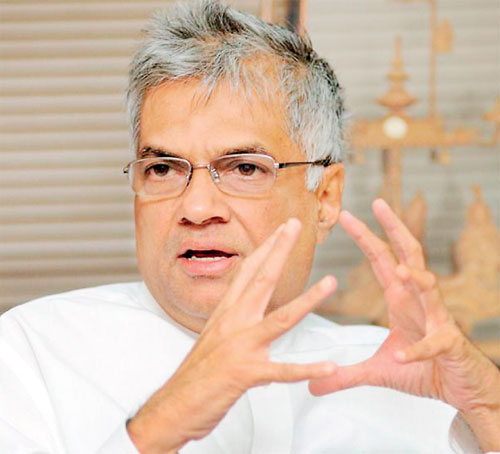Thursday Feb 19, 2026
Thursday Feb 19, 2026
Tuesday, 19 May 2015 00:01 - - {{hitsCtrl.values.hits}}
How strangely will the Tools of a Tyrant pervert the plain Meaning of Words!
– Samuel Adams
The Prime Minister’s decision to seek advice from Commonwealth jurists is a wise decision. It is a legitimate desire to seek the advice of a third party for guidance in resolving a perennial conundrum: “Sed quis custodiet ipsos custodes?”
In posing the famous question, the Roman poet Juvenal, was suggesting that wives cannot be trusted, and keeping them under guard is not a solution − because the guards cannot be trusted either.
In an article in the Sunday Times of 26 January 2013, the then Leader of Opposition Ranil Wickremesinghe went on record that  adherence to Commonwealth principles and core values was an imperative to avoid the disaster of being labelled a pariah state by the international community. Professor G.L. need not profess surprise. Neither should the JHU spokesperson Warnasinghe, the lion of many colours.
adherence to Commonwealth principles and core values was an imperative to avoid the disaster of being labelled a pariah state by the international community. Professor G.L. need not profess surprise. Neither should the JHU spokesperson Warnasinghe, the lion of many colours.
He said: “It is time for President Rajapaksa and his Government to think of the country and its people; not only of themselves and their power ride. We have no wish to ride with him in this Lamborghini to disaster.” He was commenting on the deep flaws in the impeachment of Chief Justice Shirani Bandaranayake.
His ‘weltanschsauung’ was voiced at an event where he was justifiably confident that his point of view would be appreciated. He reminded the National Consultative Summit on Media reforms that “President Maithripala Sirisena was not only the President of Sri Lanka, but also the current chair of the Commonwealth”.
That no effective editorial endorsement came in response is evidence of the effective intimidation of liberal thought by virulent nationalism in recent times.
PM should be commended and supported
The Prime Minister should be commended and supported by all citizens who wish to see democracy and the rule of law restored in the country. The advice of Commonwealth jurists in resolving an obvious impasse in the administration of justice is a recognition of an inconvenient truth.
If Mahinda Rajapaksa can seek advice in Texas for his ailments, seeking the advice of Commonwealth jurists on what ails our body politic seems eminently sensible. This good sense has dawned three months too late. Reform of the Judiciary should have been a priority in the reform agenda.
Good governance is perceived as a prescriptive principle of administrative law. It compels the State to perform its functions in a manner that promotes the values of efficiency, non-corruptibility, and most importantly in the responsiveness to civil society. It is to  be hoped that the Prime Minister will resolve the Bond business to the satisfaction of civil society that forms an essential and vital component of his natural constituency.
be hoped that the Prime Minister will resolve the Bond business to the satisfaction of civil society that forms an essential and vital component of his natural constituency.
The interim relief granted by the Supreme Court to the former Defence Secretary has surprised most ordinary citizens, including this writer. It was a greater shocker to be told by the Prime Minister that he too was taken unawares by the directive of the two-member bench of the Apex court.
The Prime Minister has rightly expressed concern that he had no means of seeking an early opportunity to reply to allegations levelled against him in the FR petition filed by Gotabaya Rajapaksa before the Supreme Court.
The public perception of the Judiciary is far removed from the image that members of the judicial process wish to project. The past 10 years saw a stampede to overturn, ignore and ridicule precedent, procedure and reason. Judicial decisions on FR applications followed an obviously political pattern. In a recent TV appearance, Dr. Harsha De Silva said: “That man Mohan Peiris chased us from the Court.”
It is indeed heartening to see the Prime Minister shedding his omni-competence and moving towards deliberate and collective action towards genuine democratic reforms.
Salutary effects of Commonwealth consultation
The salutary effects of Commonwealth consultation is that it will help us to seek views advice and guidance from Indian, Australian, South African and Canadian jurists who have advanced judicial frontiers far beyond the judicial harlotry as indulged in by Professor G.L. Pieris. He now leads the chorus of the ‘Sovereign Purists’. His appearance on TV makes any informed citizen puke.
The kangaroo court that convicted and imprisoned the 2010 presidential candidate Sarath Fonseka is a permanent blot on the judicial landscape. The subsequent endorsement of the military tribunal by the apex Court headed by a Chief Justice who ended up as a Presidential Advisor wrapped the nation in a state of abject apathy towards the Judiciary and its impartiality. The blindfolded lady exposed her double vision and mocked us with a mischievous wink.
Another retired Chief Justice regretted a past judgment reached on political bias and found it appropriate to endorse a flawed impeachment process that ousted his successor.
"The Prime Minister should be commended and supported by all citizens who wish to see democracy and the rule of law restored in the country. The advice of Commonwealth jurists in resolving an obvious impasse in the administration of justice is a recognition of an inconvenient truth"
The impeachment of the 43rd Chief Justice was reversed by an administrative fiat. Yet, the reversal of the judgment of the Court of Appeal given by the fearless Justice Sri Skandrajah by a Supreme Court presided over by a phantom Chief Justice remains on record. The visual record of the Phantom Chief Justice in the receiving line for His Holiness the Pope lies in our archives.
Justice Waragoda who acquitted the defeated General is now a Provincial Councillor of the UNP. The wronged General is elevated to the rank of Field Marshall. The three members of the Military Tribunal who convicted and jailed him retain their ranks and continue to polish their stars.
A general who addressed political meetings in uniform on behalf of his political master is rewarded with an ambassadorship. Another General brazenly handpicked to supersede many deserving officers is now sent over to dance the samba and the tango.
A majority of people identify justice as what separates good and evil. The average mind is averse to uncertainty and ambiguity. We tend to come up with explanations to seek clarity in confusion. We jealously hold on to our manufactured explanations which gather values of their own. Once we have them, we refuse to let them go.
The law in Sri Lanka
Sri Lanka has an amalgam of English Common Law, Roman Dutch Civil Law and Customary Law mostly codified by either the Dutch or the British. Rulings by Lord Justices Denning, Diplock, Wilberforce and Mac Milan often find their way in to our determinations, judgments, opinions, decisions and conclusions. It seems that in Sri Lanka all these mean the same thing. JHU worries are misplaced.
The issue is far more important to be subject to distortion by the likes of Nishantha Warnasinghe of the JHU. He has construed it as an assault on the integrity of the judiciary and national sovereignty. Though it is arrant nonsense, we must recognise the nationalism that drives them.
The reformers striving for a just society should understand the relationship between nationalism and multiculturalism. Both are significant forces in the modern world. While nationalism of the oppressed is an instrument of emancipation, nationalism of oppressors is used by the oligarchs to perpetuate their grip of power.
It is best that we seek the likes of Colonel Olcott, Ambedkar and Desmond Tutu types in the Commonwealth team of advisors.
Cognitive closure
The ouster of the despotic regime has emboldened the nation and given it fresh hope. The people insist on “cognitive closure.” The social psychologist who coined the term Arie Kruglanski defines ‘cognitive closure’ as the desire of every individual to get a firm answer to a question.
It is the craving for certainty in a less than certain world where the ghost of the tyrant is roaming the countryside with a coterie of fanatical followers. Faced with heightened ambiguity and no clear-cut answers, we need to know where we are. And that as quickly as possible.
The blindfolded Lady Justice is Alice in Wonderland confronting the Cheshire Cat. The cat is in a chatty mood. “Is our situation not dismal? Wonderland is so discombobulated! Then it turns despondent. “I can’t know everything. Pretend you’re an orphan.”
It then adds ominously to the blindfolded Alice: “But if a ferret were about to dart up my dress, I’d run.” The ferret plans to surface at Viharamahadevi Park.